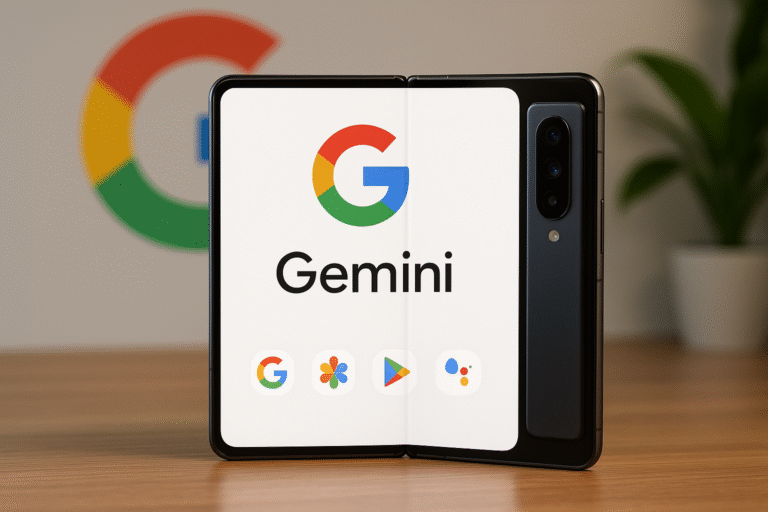After years of lukewarm reception and questionable practicality, foldable Android phones are finally hitting their stride. Google’s latest Gemini AI features aren’t just impressive technological showcases—they’re the compelling reason many consumers have been waiting for to justify the premium price and unique form factor of foldable devices.
The Foldable Phone Journey: From Novelty to Necessity
Foldable phones have faced an uphill battle since Samsung’s Galaxy Fold debuted in 2019. Early adopters dealt with fragile screens, limited software optimization, and sky-high prices that often exceeded $1,800. The technology felt impressive in demos but struggled to prove its worth in daily use.
The fundamental challenge wasn’t hardware—manufacturers like Samsung, Google, and OnePlus have steadily improved durability and refined designs. The real issue was software. Android apps weren’t designed for screens that could fold and unfold, creating awkward user experiences that felt more like workarounds than solutions.
Google’s Gemini AI changes this equation entirely. Instead of forcing existing smartphone interactions onto larger, flexible displays, Gemini creates new possibilities that take advantage of the unique properties of foldable screens.
How Gemini Transforms the Foldable Experience
Intelligent Screen Management
Gemini’s most impressive foldable feature is its context-aware screen optimization. The AI understands when you’re folding or unfolding your device and automatically adjusts the interface to match your intended use case.
When you unfold your phone, Gemini doesn’t just stretch the current app to fill the larger screen—it intelligently predicts what you want to do next. Reading an email? It might open your calendar alongside your inbox. Watching a video? The AI can surface related content or controls on the secondary screen area.
This predictive multitasking feels natural rather than forced, making the foldable form factor feel purposeful instead of gimmicky.
Advanced Multitasking with AI Assistance
Traditional Android multitasking on foldables required manual app arrangement and window management. Gemini introduces AI-powered workspace creation that automatically organizes apps based on your current task and usage patterns.
| Task Type | Traditional Foldable Experience | Gemini-Enhanced Experience |
|---|---|---|
| Work Project | Manually open email, documents, calendar | AI creates workspace with relevant apps and files |
| Travel Planning | Switch between maps, booking apps, weather | Integrated view with contextual information |
| Content Creation | Limited to single app workflows | Multi-app coordination with AI suggestions |
Seamless Conversation Continuity
Perhaps the most compelling Gemini feature is conversation continuity across form factors. When you start an AI conversation on the folded phone and then unfold it, Gemini doesn’t just maintain the chat history—it adapts the interface to take advantage of the additional screen real estate.
The AI might display visual aids, charts, or reference materials on one side while maintaining the conversation on the other. This creates a more natural, desktop-like interaction that feels impossible to achieve on traditional smartphones.
Real-World Impact: Why This Matters Now
Productivity That Actually Works
Previous foldable phones promised productivity benefits but delivered clunky compromises. Gemini’s AI coordination finally makes good on those promises. The system understands context well enough to create genuinely useful workflows.
For professionals who need to reference multiple sources, take notes, and communicate simultaneously, Gemini-powered foldables offer a tablet-like experience that fits in your pocket. The AI handles the complex orchestration that previously required constant manual intervention.
Entertainment Gets Smarter
Gemini also enhances entertainment experiences on foldables. The AI can automatically detect when you’re watching content and optimize the display configuration. It might dim secondary screens to reduce distraction during movies or provide complementary information during educational content.
Gaming benefits from intelligent control mapping that adapts to different fold positions, creating more immersive experiences than traditional smartphones can offer.
The Economics Finally Make Sense
Foldable phones remain expensive, with most models starting around $1,000 and premium options reaching $2,000. However, Gemini’s capabilities help justify these costs in several ways:
- Device Consolidation: A Gemini-powered foldable can legitimately replace both a smartphone and a tablet for many users
- Productivity Gains: The AI-enhanced multitasking capabilities can improve work efficiency enough to offset the premium price
- Future-Proofing: Gemini’s cloud-based AI continues improving, making the device more valuable over time
What This Means for Different Users
For Tech Enthusiasts
Early adopters who previously bought foldables for the novelty factor now have genuinely advanced functionality that showcases the platform’s potential. Gemini provides the software sophistication that matches the hardware innovation.
For Business Users
Professionals who need mobile productivity tools finally have a compelling reason to consider foldables. The AI-powered workflow management and multi-app coordination can genuinely improve efficiency compared to traditional smartphones.
For Mainstream Consumers
While still premium products, Gemini-enhanced foldables now offer clear value propositions beyond status symbols. The practical benefits are significant enough to justify the cost for users who prioritize versatility and productivity.
Looking Forward: The Foldable Future
Google’s Gemini integration represents a turning point for foldable Android phones. For the first time, the software experience truly justifies the unique hardware. The AI doesn’t just adapt to foldable displays—it transforms them into genuinely useful tools.
As Gemini continues evolving and more manufacturers integrate similar AI capabilities, foldable phones are positioned to move from niche curiosities to mainstream alternatives. The technology has matured beyond the early adopter phase.
The question is no longer whether foldable phones will succeed, but how quickly they’ll become the preferred choice for users who want maximum functionality in a portable form factor. With Gemini leading the charge, that future appears closer than ever.
For consumers considering their next smartphone upgrade, foldable Android devices with Gemini integration now offer compelling reasons to make the leap. The premium price is finally matched by premium functionality that’s impossible to achieve on traditional smartphones.

